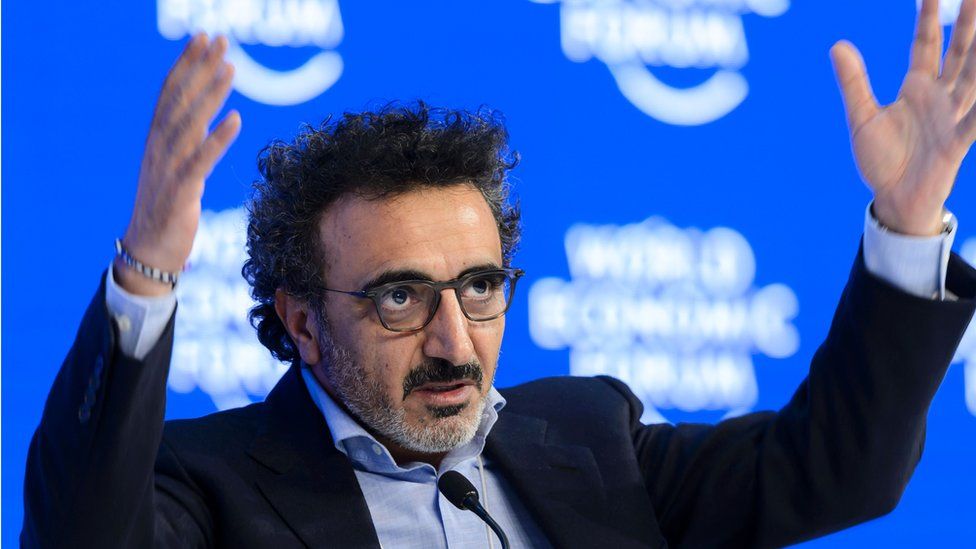'Mind-blowing' how little firms are doing for refugees
- Published

Hamdi Ulukaya says there is more businesses can do to help refugees
The billionaire boss of the US yoghurt firm, Chobani, says business must do more to help the refugee crisis.
Hamdi Ulukaya, himself an immigrant from Turkey, says it is "mind-blowing" how little business has been doing.
He was speaking at the World Economic Forum in Davos, where, through his foundation Tent, he has launched an initiative with other companies to help refugees.
They include Linked-In, Mastercard, Ikea and Air Bnb.
"This is a huge humanitarian crisis that governments and refugees are involved in. We can't just let them [handle] it…we should bring business into the issue," he says.
More than a million refugees arrived in Europe last year, mainly as a result of conflicts in the Middle East.
Mr Ulukaya, who founded and built up the New-York based yoghurt company Chobani, feels there is much more the business world can do.
He set up the Tent foundation with his own money to help after pledging to spend most of his wealth on helping refugees.
Finding work for refugees is key to their successful integration
'EU problem'
Now he wants to encourage others businesses to follow a similar course of action, which is why he is here in Davos.
He has many examples of how companies can help: Ikea supplying refugee tents - creating proper shelters that can be built by two people in an hour, Linked-In matching refugee skills with employees and Mastercard giving out a type of debit card that can be used by refugees to shop with.
Chobani also makes a point of hiring refugees in the US.
It is this sort integration that Helene Rey, named 'the economist to watch' by The Economist magazine and beneficiary of the European Research Council, thinks is vital in alleviating the situation.
Economist Helene Rey was speaking in Davos as a beneficiary of the European Research Council
"One of the main factors behind successful integration of refugees is whether or not they have a job."
She adds it is important for companies to think about how to use unskilled as well as skilled labour.
"We need to invest in the safety of refugees…as well as their integration, for example helping with language skills so they they can find some work."
Of course, that requires resources and Ms Rey thinks it should be paid for by issuing a EU bond, backed by its budget.
"This is a European Union problem and the burden is not being equally shared.
"Germany can not go on like this…the stakes are high," she says, admitting it may be politically difficult to agree, but "we're already in a politically difficult situation".
Yoghurt project
Mr Ulukaya, who came to the US as a student, credits his entrepreneurial success in part to the fact that he loved New York.
The Chobani yoghurt factory in New York State
"It's really important to feel at home…I appreciated their way of life and focused on what we had in common rather than our differences."
Although it's true to say that it was a difference that inspired him to start his company - he couldn't find yoghurt as he knew it.
"I was from a dairy farm," he says.
"I just wanted to make my mum's style yoghurt.
- Published22 January 2016
- Published22 January 2016
- Published21 January 2016
- Published21 January 2016
- Published21 January 2016
- Published21 January 2016